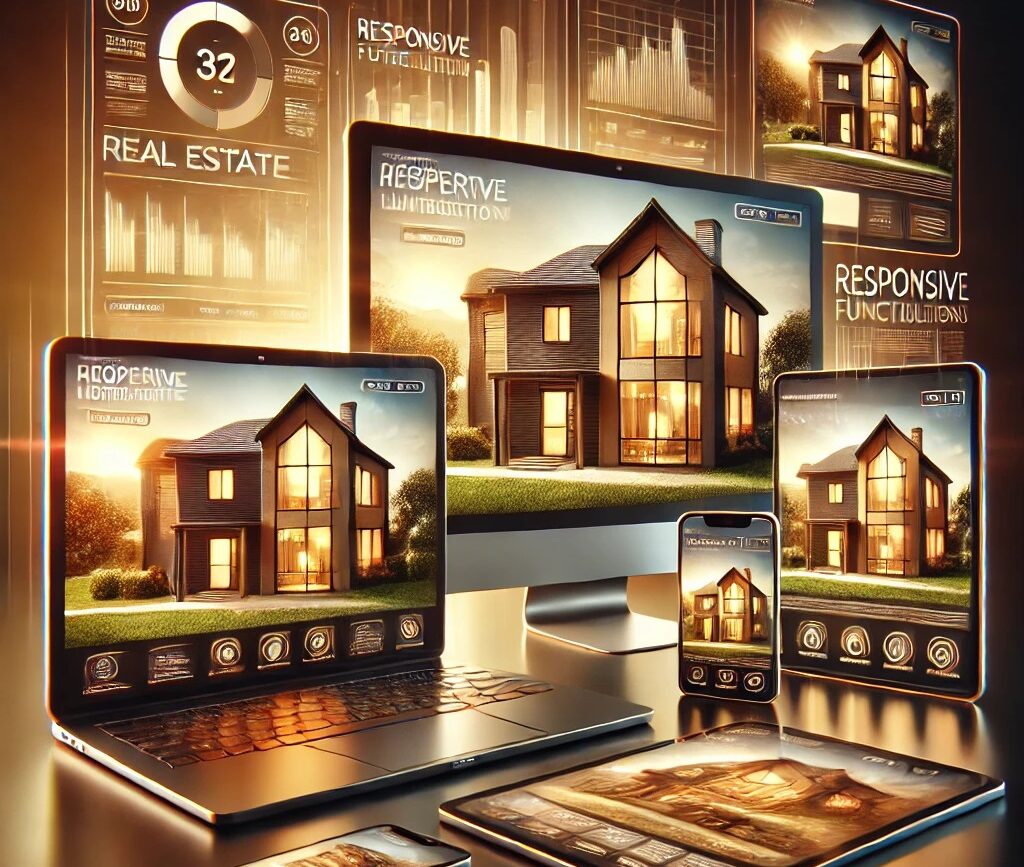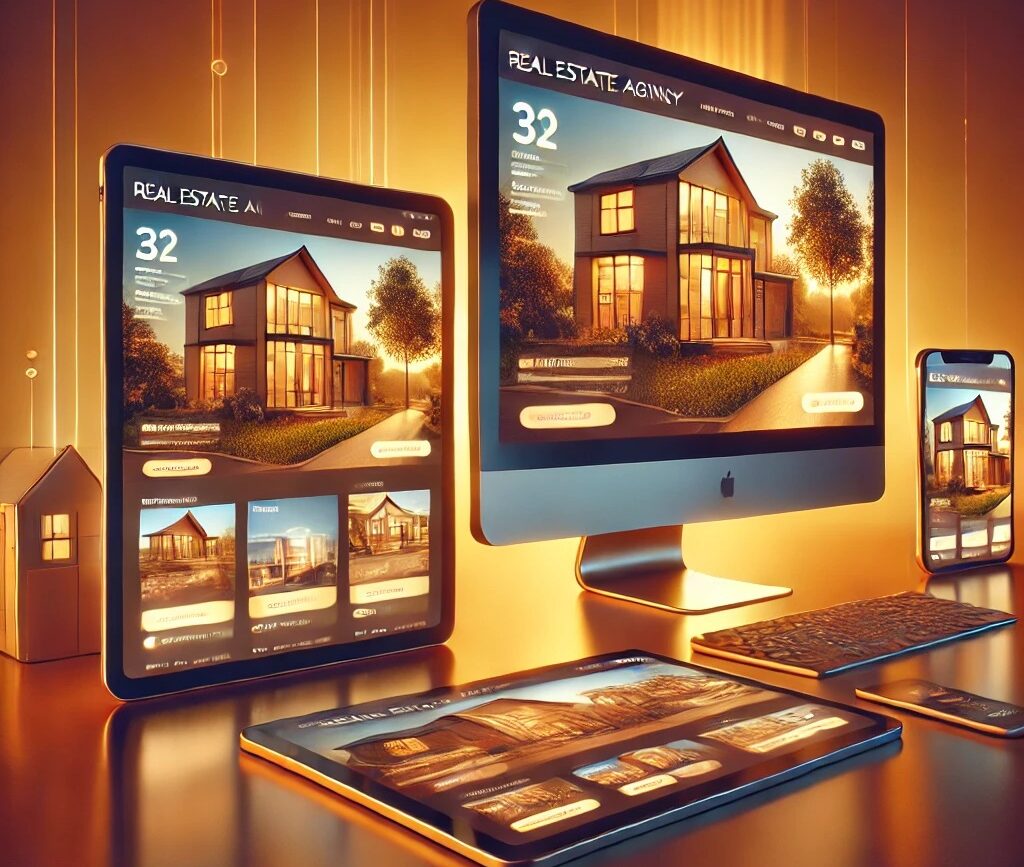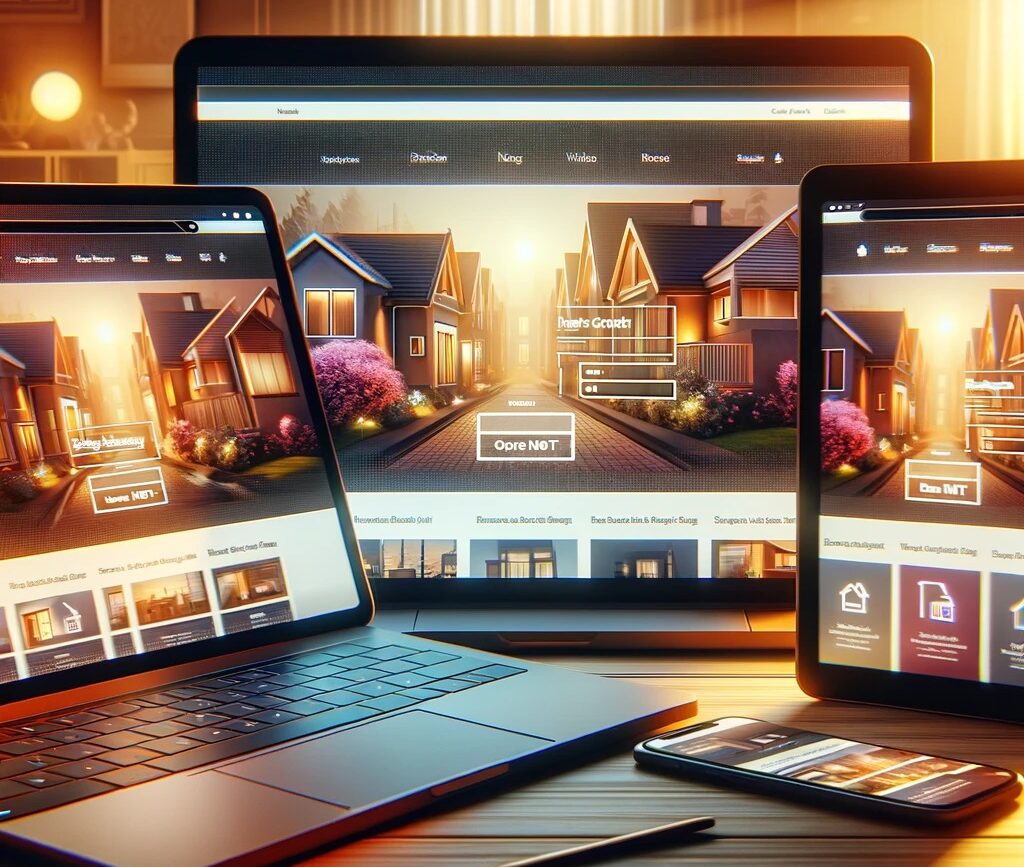In today’s digital age, a robust online presence is essential for estate agencies. A well-designed website serves as a virtual storefront, attracting potential clients and showcasing properties. It is often the first point of contact between an agency and prospective customers, making it crucial for creating a positive first impression.
Key elements of an effective real estate website
An effective real estate website should include:
+ User-friendly navigation
+ High-quality images and videos of properties
+ Detailed property listings
+ Advanced search functionality
+ Mobile responsiveness
+ Clear contact information
+ Integration with social media platforms
How these examples can inspire your own design
By examining successful estate agency websites, you can gain insights into effective design strategies, user experience improvements, and innovative features. These examples will provide inspiration for creating a website that not only looks professional but also functions efficiently to meet the needs of your clients.
Luxury Real Estate: The Opulent Approach
Example 1: Sotheby’s International Realty
Sotheby’s International Realty’s website exemplifies luxury real estate marketing. The site features:
+ Large, high-resolution images of exclusive properties
+ A clean, sophisticated design that reflects the brand’s prestigious image
+ Advanced search options for finding luxury properties worldwide
+ Virtual tours of high-end listings
Example 2: Christie’s Real Estate
Christie’s Real Estate website showcases:
+ A global portfolio of luxury properties
+ Elegant typography and a refined color palette
+ Curated collections of properties based on lifestyle categories
+ Detailed market reports and insights for luxury real estate investors
Key features of luxury real estate websites
Luxury real estate websites typically include:
+ Emphasis on high-quality visuals
+ Exclusive property listings
+ Personalized services for high-net-worth clients
+ Detailed information on property amenities and surrounding areas
Modern and Minimalist Designs
Example 3: Compass
Compass’s website stands out with its modern, minimalist approach:
+ Clean, uncluttered layout
+ Bold typography and ample white space
+ Intuitive property search functionality
+ Integration of market data and trends
Example 4: Redfin
Redfin’s website demonstrates a user-friendly, minimalist design:
+ Simple, intuitive navigation
+ Clear presentation of property information
+ Integration of user reviews and agent profiles
+ Mobile-first design approach
Benefits of a clean, user-friendly interface
A clean, user-friendly interface offers several advantages:
+ Improved user experience and navigation
+ Faster loading times
+ Enhanced focus on property listings
+ Increased likelihood of user engagement and conversions
Innovative Use of Technology
Example 5: Zillow
Zillow’s website showcases innovative technology integration:
+ Zestimate tool for property value estimation
+ 3D home tours and video walkthroughs
+ AI-powered recommendations based on user preferences
+ Integration of mortgage calculators and lender information
Example 6: Trulia
Trulia’s website demonstrates technological innovation through:
+ Interactive neighborhood maps with local insights
+ Crime heat maps and school ratings
+ Personalized property alerts based on user criteria
+ Integration of user-generated content and reviews
Incorporating virtual tours and 3D floor plans
Virtual tours and 3D floor plans enhance the user experience by:
+ Providing a more immersive property viewing experience
+ Allowing potential buyers to explore properties remotely
+ Reducing the need for in-person viewings
+ Helping clients visualize the layout and flow of a property
Local Expertise and Community Focus
Example 7: Corcoran
Corcoran’s website emphasizes local expertise:
+ Neighborhood guides with detailed information
+ Local market reports and trends
+ Profiles of local agents with area specializations
+ Community events and lifestyle content
Example 8: Douglas Elliman
Douglas Elliman’s website showcases community focus through:
+ Comprehensive area guides for each market they serve
+ Local real estate market reports and analysis
+ Featured local properties and new developments
+ Integration of lifestyle content relevant to each community
Showcasing neighborhood knowledge and local insights
Demonstrating local expertise on your website:
+ Builds trust with potential clients
+ Provides valuable information for buyers new to an area
+ Positions your agency as a local authority
+ Enhances the overall value proposition of your services
Niche Market Specialization
Example 9: The Agency (focus on celebrity properties)
The Agency’s website caters to the celebrity property market:
+ Exclusive listings of high-profile properties
+ Discreet handling of sensitive information
+ Emphasis on privacy and security features
+ Showcasing of properties with unique amenities and features
Example 10: Green Residential (eco-friendly homes)
Green Residential’s website specializes in eco-friendly properties:
+ Listings of energy-efficient and sustainable homes
+ Information on green building certifications
+ Resources on environmental impact and energy savings
+ Highlighting of eco-friendly features in property descriptions
Tailoring your website to a specific market segment
Specializing in a niche market can:
+ Differentiate your agency from competitors
+ Attract a specific target audience
+ Establish your agency as an expert in a particular field
+ Allow for more focused marketing efforts
Essential Features for Your Estate Agency Website
Advanced search functionality
Implementing advanced search features:
+ Allows users to filter properties based on specific criteria
+ Improves user experience by providing relevant results
+ Reduces time spent searching for suitable properties
+ Increases the likelihood of generating quality leads
High-quality images and videos
Incorporating high-quality visual content:
+ Showcases properties in their best light
+ Provides a more comprehensive view of listings
+ Increases user engagement and time spent on the site
+ Improves the overall perception of your agency’s professionalism
Mobile responsiveness and fast loading times
Ensuring mobile responsiveness and quick loading:
+ Accommodates users browsing on various devices
+ Improves user experience and reduces bounce rates
+ Positively impacts search engine rankings
+ Increases the likelihood of conversions and inquiries
Optimizing Your Website for Search Engines
Implementing SEO best practices
Applying SEO best practices involves:
+ Using relevant keywords in content and metadata
+ Creating descriptive, unique title tags and meta descriptions
+ Optimizing images with alt text and descriptive file names
+ Ensuring a logical site structure with internal linking
Creating valuable content for potential clients
Developing valuable content:
+ Establishes your agency as a trusted source of information
+ Improves search engine rankings for relevant keywords
+ Increases user engagement and time spent on your site
+ Provides opportunities for internal linking and SEO optimization
Leveraging local SEO strategies
Implementing local SEO strategies:
+ Improves visibility in local search results
+ Helps attract clients in your specific geographic area
+ Involves optimizing for location-based keywords
+ Includes creating and maintaining accurate business listings
Integrating Social Media and Customer Engagement
Connecting your website with social platforms
Integrating social media:
+ Expands your online presence across multiple platforms
+ Allows for easy sharing of property listings and content
+ Provides social proof through likes, shares, and comments
+ Offers additional channels for customer communication
Encouraging user reviews and testimonials
Incorporating user reviews and testimonials:
+ Builds trust with potential clients
+ Provides social proof of your agency’s quality of service
+ Can improve search engine rankings
+ Offers valuable feedback for improving your services
Implementing live chat and contact forms
Adding live chat and contact forms:
+ Provides immediate assistance to website visitors
+ Increases the likelihood of capturing leads
+ Improves user experience by offering multiple contact options
+ Allows for efficient handling of inquiries and follow-ups
Measuring Success and Continuous Improvement
Tracking key performance indicators
Monitoring important metrics:
+ Helps assess the effectiveness of your website
+ Provides insights into user behavior and preferences
+ Allows for data-driven decision making
+ Identifies areas for improvement and optimization
Analyzing user behavior and feedback
Studying user behavior and feedback:
+ Reveals how visitors interact with your website
+ Identifies potential usability issues or pain points
+ Provides insights for improving user experience
+ Helps tailor your website to meet user needs and expectations
Regular updates and A/B testing
Implementing regular updates and A/B testing:
+ Ensures your website remains current and relevant
+ Allows for testing of different design elements and features
+ Helps optimize conversion rates and user engagement
+ Keeps your website competitive in a rapidly evolving digital landscape
Summary
Creating an effective estate agency website requires careful planning, design, and ongoing optimization. By drawing inspiration from successful examples and implementing key features, you can create a website that not only showcases your properties but also provides value to your clients and establishes your agency as a trusted authority in the real estate market.
FAQs
How much does it cost to create a professional estate agency website?
The cost of creating a professional estate agency website can vary significantly based on factors such as design complexity, functionality requirements, and the chosen development method. A basic website might cost between $5,000 to $10,000, while more complex sites with custom features could range from $20,000 to $50,000 or more.
How often should I update my real estate website?
It is advisable to update your real estate website regularly. This includes:
+ Daily or weekly updates to property listings
+ Monthly content updates (blog posts, market reports, etc.)
+ Quarterly reviews of overall design and functionality
+ Annual comprehensive evaluations and major updates if necessary
What are the most important features for a real estate website?
The most important features for a real estate website include:
+ Advanced property search functionality
+ High-quality images and virtual tours
+ Detailed property listings with comprehensive information
+ Mobile responsiveness
+ Easy-to-use contact forms or inquiry systems
+ Integration with MLS (Multiple Listing Service)
+ Blog or resources section for valuable content
How can I make my estate agency website stand out from competitors?
To make your estate agency website stand out:
+ Focus on a unique value proposition or niche market
+ Implement innovative features or technologies
+ Provide exceptional, high-quality content
+ Ensure a user-friendly, visually appealing design
+ Showcase your local expertise and community involvement
+ Offer personalized experiences for users
Is it necessary to hire a professional web designer for my real estate website?
While it is possible to create a website using templates or DIY platforms, hiring a professional web designer is often beneficial for real estate websites. A professional can:
+ Create a custom design that aligns with your brand
+ Implement complex functionalities specific to real estate
+ Ensure optimal user experience and responsiveness
+ Provide ongoing support and maintenance
+ Stay updated with the latest web design trends and best practices
However, the decision ultimately depends on your budget, technical expertise, and specific needs.
Inspired by these standout estate agency websites? Now it’s time to elevate your online presence! Our team specializes in designing custom real estate websites that attract clients and drive results. Let us help you create a stunning, user-friendly website that sets your agency apart. Get in touch with us today!







